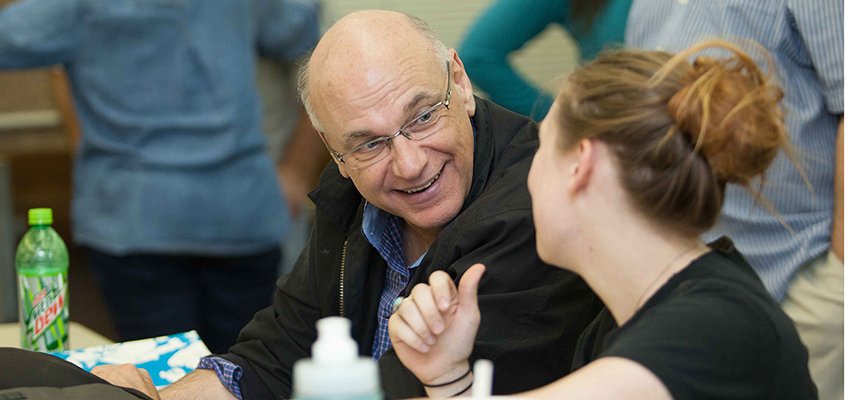In the history books, the story of how rural America went from candlelight to electrification in the 1930s might sound dull—Congress passes a law, cooperatives are formed, farmhouses get power.
But to Don Shandrow M.S. ’76, that story had all the makings of good theater—the haves versus have-nots, mistrust of the government, high tension among ordinary people trying to accomplish something extraordinary. In his day job, Shandrow spent years hearing co-op leaders share their stories, their proud history, their role shaping today’s rural America, before he decided to turn those tales into a play.
Now, a decade after the light bulb went off for Shandrow, his play Send the Light will debut in a College of Fine Arts production co-sponsored by one of the very co-ops that inspired his work.
“It’s really about a unique time in our history,” said Shandrow, who earned his master’s degree in theatre at Illinois State. “You think about all the things that electricity gives you, and just imagine if that was all taken away. It was a huge difference in the way people lived.”
Send the Light runs October 17-26 and is directed by Connie de Veer and Michael Vetere. The play, set in 1936, centers around the controversial creation of the Rural Electrification Administration (REA) and its impact on farm communities. Many groups, especially utility companies, opposed the federal government’s involvement in developing and distributing electric power, and the play’s central plot follows a character who wants to “send the light” to his county despite the resistance.
Before the REA, only 10 percent of rural Americans had electricity, compared to nearly 90 percent of urban residents. Years ago, in his job with an insurance company that sent him traveling to co-ops around the Midwest, Shandrow heard from a Bloomington woman who recalled “seeing the lights of Bloomington” in the distance from her darkened farmhouse. Today, her home would sit just south of Veterans Parkway.
“That distance was a gulf,” he said.
But thanks to the cooperatives, a quarter of rural homes had electricity by 1939. Today, the 900 or so private, not-for-profit co-ops (owned by the customers they serve) bring electricity to an estimated 42 million people in 47 states, or around 12 percent of all meters in the U.S.
The birth of rural cooperatives is an “incredible story of American spirit and determinism,” about farmers banding together to accomplish what was impossible to achieve on their own, said Erin Campbell, spokeswoman for Corn Belt Energy, a Bloomington-based electric cooperative.
Corn Belt, with 35,000 member-owners, is a supporter of Illinois State’s Send the Light production, helping bring students from local schools to the performances, among other support.
“We’ve provided photos, documents, and detailed writings of our own cooperative history so the production team can put the events of rural electrification into local context,” Campbell said. “Rural electrification improved the lives of so many, and this production is a way to honor the pioneers who worked hard to make it happen.”
Crafting the play
Shandrow first hatched the play 10 years ago, producing a shorter, 45-minute version with vignettes from only four actors (playing multiple characters) and music written by another Illinois State alumnus, Phil Shaw ’81, M.F.A. ’86. School of Theatre and Dance Director Janet Wilson found out about the play after Shandrow recently staged a version of it at his Bloomington theatre company, New Route, where he is artistic director, and asked him if he could expand it.
So Shandrow got to work, turning Send the Light into a 30-character play that runs about 90 minutes, still featuring tone-setting music from Shaw. Shandrow has attended almost every rehearsal, serving as a resource for actors who wondered which characters were real people, and which were composites.
“It’s a lot of fun,” Shandrow said, who lives in Bloomington and works for Humana.
Bloomington-Normal is a great place to premiere this latest iteration of the play, he said, because of the community’s rural roots. Even today, parts of Bloomington-Normal look like a Chicago suburb, though “it’s a community with one foot still in agriculture.” Shandrow himself is a member of Corn Belt, but even he didn’t understand its rich history and impact on rural life until this play.
“It’s a community in transition,” said Shandrow.
The School of Theatre and Dance is excited to partner with Corn Belt on the production, Wilson said.
“Most of our students today have no idea what it was like to live without electricity—unless they have family stories that have been passed down to them,” Wilson told STATEside. “This is a wonderful educational and community partnership that serves to enrich us all.”
Ryan Denham can be reached at rmdenha@IllinoisState.edu.



